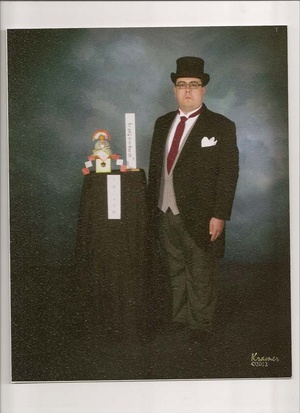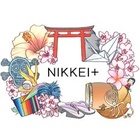Most Nikkei have the luxury of being brought up with the tradition of our fatherland. To be taught the meaning of Obon by your parents, a Buddhist priest, or both. To be read stories as a young child of a boy sprung up from peaches, tongueless sparrows. Or, if your parents were well read, to hear the fable of a young master from Tokyo known as Botchan bring a Machiavellian red shirted devil from the boondocks down with a well placed punch. To appreciate the taste of good Japanese food without paying exorbitant prices for having it made for you. These are the luxuries that my Nikkei brothers and sisters can enjoy without a second thought.
I have not had those luxuries, the Ainoko who writes to you taught himself these feelings, thoughts, and beliefs.
I was born to a Half Japanese/German-Irish Father and a Half Italian/Swedish Mother. Therefore my Nikkei blood is one quarter. I do not look like a Japanese man, but an acquaintance who is also an Ainoko said that my eyes look Japanese. That’s not to say my eyes have the almond shape I’ve longed for since I was 15, but that the eyes themselves had that same deep stare, that fire that even though adversity would try to extinguish, would never truly die.
My upbringing was a truly bland one. Before I went to school, I was content to sit myself down in front of the television all day long. I ate Western food. Neither my father nor my mother taught me of my ancestry or any such thing. And I wasn’t curious enough to ask. The closest thing I had to ethnic knowledge was when my Grandma Chie would come to visit.
Ah, my Grandmother. I didn’t know the word Oba-san yet, so I just called her Grandma. Her accent was too thick for me to understand her and though I never dreaded her visits, I was a painfully shy child in front of her. Regardless, she would bring my brother and I fine presents from Japan whenever she visited. I would always end up ruining them. I loved her, but I didn’t understand her. She died when I was twelve and it is one of my greatest regrets I never knew her closer.
My “self-education” began when I was nine. I liked to read, so I often went to the library in my town. One day, I walked along the section where they kept the books about the countries of the world. Feeling as though I should read about my ethnic background, I grabbed about twenty books concerning themselves about the aforementioned countries. I took them home and read them for about two weeks. Because the mind of a child can only keep one or two things to mind, I had to decide which of these countries I should carry on reading about. My mind chose “Japan.” Why, I do not know. Perhaps because it was the country least like the others, I couldn’t say yet it was due to some ethnic pride, my mind didn’t understand such things yet. But I chose Japan, read those books a second and third time, returned them all, and my self-education began.
The books and videos I started with were truly simple things which told you tidbits like; “Japan is a country in Asia,” “its system of money is called the Yen,” “It is a parliamentary democracy headed by a man known as the Emperor.” I would study these facts until they were burned into my eyes and brain so that if one gave out, the other could make up for it. As soon as I could memorize everything in children’s books, I went in to the adult’s section in search for more information. I found those books and read more detailed information of Our history. “The Salaryman is the job that most children in Japan want when they grow up.” “The first novel written in the history of humanity was The Tale of Genji by Lady Murasaki.” “In the year 1868, the Shogunate was felled by a group of patriots hoping to reinstate the emperor as the head of state.” (It wasn’t until I was eighteen that I learned how false this statement would be.)
Soon, I grew tired even of these books. So I started staying at home and searching the internet. And I learned of the current events of our Sokoku (Fatherland) and I learned of opportunistic politicians and Prime Ministers who favored the privatization of Japan Post and the building of a “Patriotic Japan” before the Opposition became the establishment for a few short years. But an apocalyptic tsunami and nuclear fallout would soon put an end even to them. And from that, I became the Man who writes to you here and now.
A Man who revels in Gunka (military songs). A Man, who in the heart of the American South, purchased a Kyokujitsu-ki (Rising Sun Flag) without a qualm. And when He hears a trumpet blaring in an Enka record feels his heart and pride swell three times and straightens his back up that much straighter. This is the Japan I savor and worship. Not the one of slipper toting Geishas and dreary, colourless Sarariman, nor two timing schemers. Ore no Nippon (My Japan) consists of the Clever Men like Mifune Toshiro, The Noble Fools like Atsumi Kiyoshi, the Irreverent yet Honorable Yakuza of Bunta Sugawara. And the Noble and Inviolable Samurai of Koji Tsuruta.
Yet my “self-education” in the end, comes to naught.
Why?
In the end, I am an Ainoko.
The fair-skinned maiden
May laugh at my wide eyes
and boorish gait
But they all fail to respect
My Yamato Damashi (Japanese Spirit)
If I should bump into a brother or sister Nipponjin and dip my head in apology with a grunt of suman (pardon), They laugh.
On Shogatsu (New Years) should I attend a festival resplendently dressed in morning coat, silk hat, and high collared shirt, They stare as if I’m nude.
If I should talk with a man of literature, and glorify Yukio Mishima’s cerebral and passionate works, They think me either patronizing or mad. (Depending on their political views.)
I don’t mean to beat the drum of the tragic Hapa. And I know that my one story of melancholy will be smothered by one hundred stories of cheer. Yet to deny that my self-education may prove in the end to be all for naught would be to paint to rosy a picture.
To my death the Hinomaru is my flag, Saba Shioyaki (Grilled salted mackerel) is my comfort food, and my home will always have a portrait of the Emperor in the place of honor. I am a Japanese Man at Heart and Blood, no matter the paleness of my pallor or the circumference of my eyes. Even if I will never have the money to afford a trip to the Sokoku, I will be content if when I die, a Torii is carved on my grave.
I am an Ainoko, that may be true. Yet I am still a Nipponjin!
© 2013 Nicholas Braun




